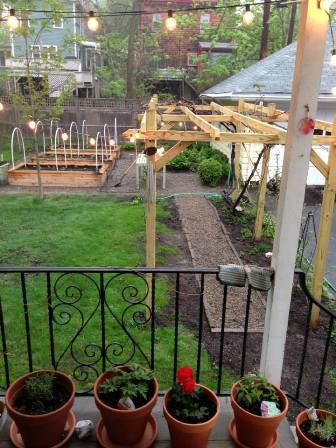People who want to grow their own vegetables but have never done it before often need a little guidance and encouragement. It’s hard to know where to begin, what to plant when, and such.
Some answers to common question for those who are new to the gardening game:
Should I grow my vegetables in pots, or in garden beds?
Growing vegetables in pots takes more work than one would think. In the summer, it’s hot, and the soil in a small pot will dry out fast. Potted plants require frequent watering, as well as frequent fertilizing. Raised beds, on the other hand, offer the joy of minimal garden tending effort with amazing results. Yes, they take some work up front – but it’s well worth it for busy people on the go.
What should I do to prepare the garden beds?
For the best, most prolific and lush organic vegetable garden, you want to get a few things going in early spring. Such as…
Bring in some excellent soil. We get ours from a local grower who provides compost-rich organic garden dirt. It will be a bit of an up-front expense, but if you keep a compost bin then you won’t have to buy soil again for several years and maybe never again. We don’t mean a few bags from the big-box outfits. We mean a truckload (or 2, or 3) hauled in and deposited right at the site where you intend to keep your garden.
Dig out and frame the beds. Here at GardenBedsNJ.com we use non pressure-treated lumber to build garden beds for our customers. This is important because you don’t want any harmful chemicals leaching into the ground where your food will grow. The framing is a huge benefit because it prevents the beds from eroding and becoming flat. The key to growing beautiful organic produce is having deep, fluffy, organic-matter-rich soil in which to grow the plants.
Begin compost production. You can do this successfully even if you don’t have a lot of space. We sell compost tumblers that Mike recycles from used containers and drills vent holes. Your recipe for good compost will be half green matter (such as pesticide-free grass clippings); half brown matter (decaying leaves), and enough water to create the moisture consistency of a wrung-out sponge.
Is there a specific date that the garden must be planted by?
Different vegetables require different planting dates. Some will take longer than others to mature and be ready for harvesting and eating. Your typical hot-weather loving plants such as tomatoes, cucumbers, eggplant and peppers, can be planted around May 15 in NJ Zone 6.
The date from which you transplant young plants into your garden beds will be later than the date you should start the plants from seeds, if you plan to do that. Some seeds can be sown directly in the garden, while other plants require more TLC and must be coaxed to life under a growing lamp. Your best bet for learning when to plant various types of veggies and herbs, is to check the back of the seed packet or stick label for each one you plan to have in your garden. You can also pick up a copy of our handy Beginner’s Guide to Organic Gardening in NJ Zone 6.
Can I plant all my vegetables at once?
No, but you can plant them in groupings. As stated above, different plants require planting at different times of the year. Some vegetables thrive in cooler weather and some rely on the heat of summer to produce their fruit. It’s a good idea to find out which plants need to go into the ground at which times, and then buy seed packets or young plants that can all be planted at the same time.
How far apart should I space my garden plants?
Check the label of the seed packet or the plastic stick tab that comes with any nursery plant you buy. You can also easily research this information online, but you must take our Hardiness Zone into account. We include this information in our NJ garden planting guide, so maybe grab your own copy to have as a handy reference!
How often should I water?
The “average” amount of water that a vegetable garden should receive is 1 inch per week. It’s hard to know what one inch is when you’re watering with a hose. Basically, water deeply, and be sure the soil is saturated completely, then let it dry out over several days up to a week. The amount of rainfall will affect how much you need to water.
My personal rule of thumb is that if it’s extremely hot and dry, then I watch for my garden plants’ leaves to begin looking droopy. Once that happens, I water. So, you may in fact be watering more than once per week – it just depends on what the weather is doing.
Newly planted seeds must be kept in moist soil in order to germinate. Water your freshly sown seeds daily until the little plants become established.
When will my veggies be ready to eat?
Your garden veggies are ready to pick once they resemble the veggies that you would find in the produce section of your local grocery store! Size, ripeness, and other fairly obvious characteristics will factor in. Some veggies can become over-ripe. For example, peas that bulge out of the pods may be “too ripe,” as are tomatoes that have become soft and slightly mushy.
We have included detailed information on planting and growing garden vegetables in NJ Zone 6. This guide is ideal for new gardeners who live in New Jersey and have little to no clue about how to start a garden on their own.
Download your copy of our 95-page organic gardening guide today!
